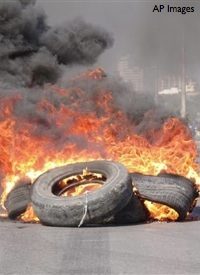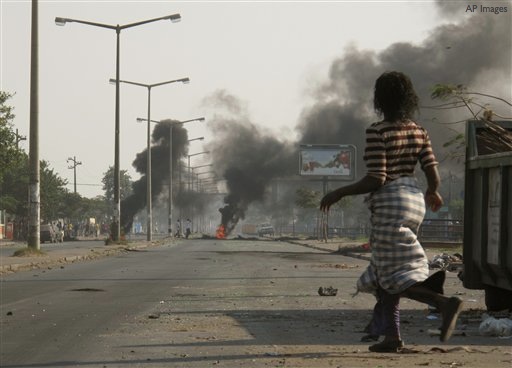
The violence began on September 1, following government mandated increases in prices of commodities like food and water. London’s Telegraph newspaper reported that "Mozambicans have seen the price of a loaf of bread rise by 25 percent, from four to five meticais (from about 11 cents to about 13 U.S. cents) in the past year. Fuel and water prices also have risen."
Spurred by the increases, protestors took to the streets, reportedly stoning cars and buildings in Maputo, the nation’s capital. Police responded by opening fire on the protestors. The death toll, according to journalist Fred Katerere reporting for Bloomberg news from Maputo, has risen to seven, with another 280 injured in the fighting.

The rising prices are not the result of market forces. The Mozambican government of President Armando Emilio Guebuza controls the pricing of food, water, and electricity. This is not the first time similar government action has led to riots in the country. In 2008, riots led to the death of three people. Prior to that, decades of war sparked by the Marxist and Soviet supported Liberation Front of Mozambique (FRELIMO) left the nation wrecked and beset by extreme poverty and illness.
In Maputo, the government continues to try to crack down on the protests, now in their second day. "Our efforts are to stop the strike and we have mobilized all our resources to control it," a police spokesman said, according to the Telegraph. "We don’t know who is organizing it, but we are trying to identify the strike leaders or organizers."
So far the victims of the police response have included children. "Parts of the capital Maputo descended into chaos, with women crying in anguish at the violence and protesters running through the streets carrying the wounded. A boy of about 12 could be seen lying motionless on a Maputo street in a pool of blood," the Associated Press reported. State-run television in Mozambique also reported that one of the victims was a six-year-old girl who was shot while "on her way home from school."
Neighboring South Africa has warned its citizens traveling to Mozambique to use caution, noting that "there have been sporadic incidents of stoning and blockades of roads in the vicinity of Maputo, including the airport." The South African government went on to note that airlines flying into the airport in Maputo cancelled flights on September 1.
So far, the government has no plans to reconsider the price increases. "The price hikes are irreversible," Cabinet spokesman Alberto Nkutumula said at a press briefing.



